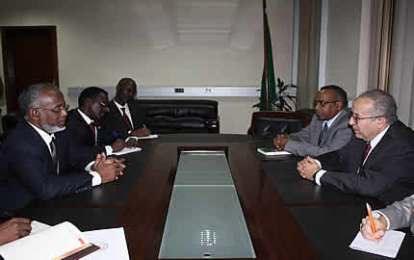African mediation hands “urgent proposals” to Sudan and South Sudan
June 12, 2013 (KHARTOUM) – The head of the African Union (AU) mediation handed has over “urgent proposals” to Khartoum and Juba in a bid to overcome the recent tensions between the two capitals that led Sudan to freeze the implementation of a cooperation treaty.

Lamamra and the two officials discussed “the urgent proposals that the chairperson of the AU High-level Implementation Panel (AUHIP), former South African president Thabo Mbeki, formally conveyed to the heads of state of the two countries on the 9 June, with a view to decisively resolving some crucial implementation issues”, a statement released by the African body said on Wednesday.
Regional and international bodies urged the two sides to commit themselves to the cooperation agreements signed on 27 September 2012 and to fully implement the conditions. They also asked Khartoum not to stop the flow of South Sudanese oil, urging the two sides to end their support to rebel groups.
The Sudanese government sent officially a letter notifying Juba and foreign oil companies of its decisions to shut down oil flows as of 9 June, adding that the stoppage process will take two months to proceed.
The decision is seen as a setback in the normalisation process between the two countries, but also a failure of the efforts carried out by the AU mediation team, with the international community which backs the panel seemingly unable to take further action.
Lamamra called on both Khartoum and Juba to give “an urgent positive response”, in order to take concrete steps aimed at assisting the two parties to address the situation.
Sudanese president Omer al-Bashir, who ordered the shut down South Sudanese oil flow, said he would not accept Juba oil exports through Sudanese territory, accusing the new nation of using revenues to fund rebel groups aiming to topple his regime.
Juba has continually denied providing any support to rebel groups, although various western sources speak about the presence in South Sudan of Sudanese rebels who are active in the landlocked states of Blue Nile, South Kordofan and Darfur.
(ST)
